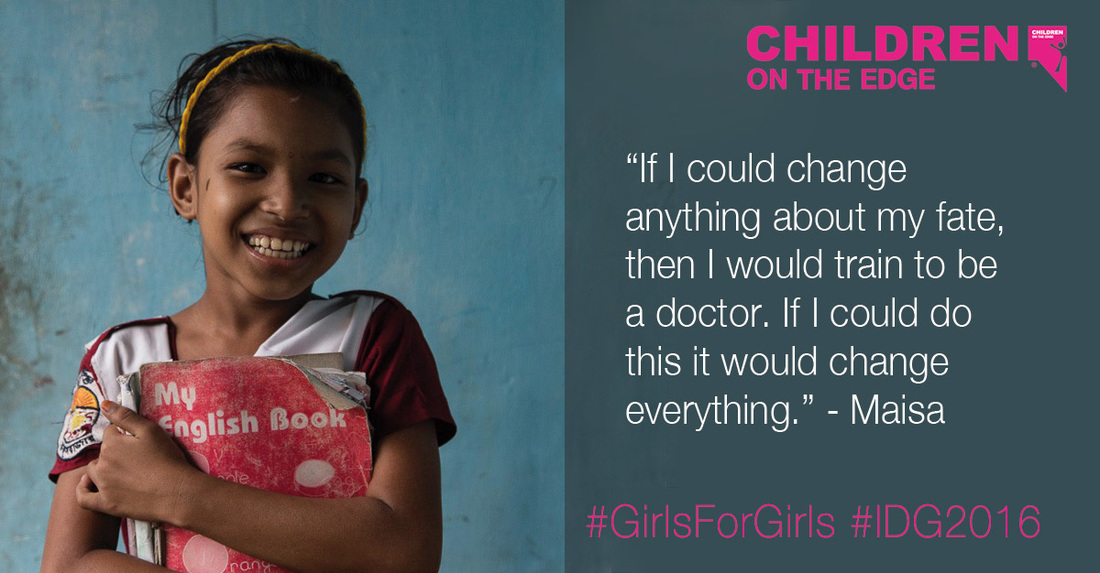|
In Bangladesh, the plight of poor families is desperate and access to basic essentials is scarce. UNICEF estimates that over 5 million children between 5 and 14 years old are sent out to work, often in dangerous conditions, leaving them vulnerable to exploitation and abuse. Maisa is 12 years old and lives in a slum area of Cox’s Bazar, Bangladesh. Her father died when she was very young and she has to work to help with her family’s income. A few years back she was making garlands with her mother, but her mother has become increasingly ill with a heart problem and diabetes. Mow Maisa has to earn money working on the beach as tour guide and water seller. Because of her family’s situation there is great pressure on her. “I run the family with one of my sisters who also earns money this way”, says Maisa, “I’ve also grown a vegetable garden at the back of our hut”. Not only this, but as a girl, despite legislation from the government, there is still a cultural expectation that the best option for her is to be married young. One parent from the community described how “Unmarried girls are at risk of sexual advances, harassment, rape and kidnap. They are safe from this if they are married. In our country girls cannot earn, only boys can earn so girls have to marry. Girls just have to produce children.” Maisa has no desire to get married early. She explains “If I could change anything about my fate, then I would train to be a doctor. If I could do this it would change everything.” The Community Schools we support in Cox’s Bazar provide a free education in the afternoons for children like Maisa. Here they have a few hours to learn, rest and play with their friends. They are free from any adult responsibilities and given the chance to just be children. All the students follow a BRAC curriculum and are prepared to access government schools at a later stage to continue their education beyond Grade 3. They are also encouraged in creative art and expression. Alongside this, teachers and staff from the programme build relationship in the community with parents and raise awareness about the importance of girls remaining in education, as well as the dangers and damaging effects of child marriage. Maisa has been attending one of these schools for a few years now and has made great progress. She is also part of the child council so she can have her voice heard, influence the shaping of the project and represent the views of her friends. “Before I was in school, people looked down on me and used bad words.” says Maisa, “Now I am in school I don’t get this happening. I can read and write, so my neighbours and relatives praise me instead. I was spending time with bad people when I didn’t go to school. Now I study. I have hope now, that I will get a job which will change things for my family.” Find out more about the Community Schools for working children and read other stories about Bangladesh.
Consider a donation to this work, either at our donate page or by texting EDGE16 and your amount (£1, £2, £3, £4, £5 or £10) to 70070. Take on a challenge and fundraise for the project. Support usComments are closed.
|
RECEIVE OUR EMAILSBlog Categories
All
Archives
July 2024
|
|
JOIN US ON SOCIAL MEDIA
|
Annual Report | Contact Us | Jobs | Media Centre | Resources | Shop
Accessibility & Policies: Accessibility | Equity, Diversity & Inclusion Policy | Complaints| Privacy Policy | Safeguarding
Accessibility & Policies: Accessibility | Equity, Diversity & Inclusion Policy | Complaints| Privacy Policy | Safeguarding
Children on the Edge, 5 The Victoria, 25 St Pancras, Chichester, West Sussex, PO19 7LT, UK | 01243 538530 | [email protected]



 Give monthly
Give monthly Fundraise for us
Fundraise for us RSS Feed
RSS Feed
